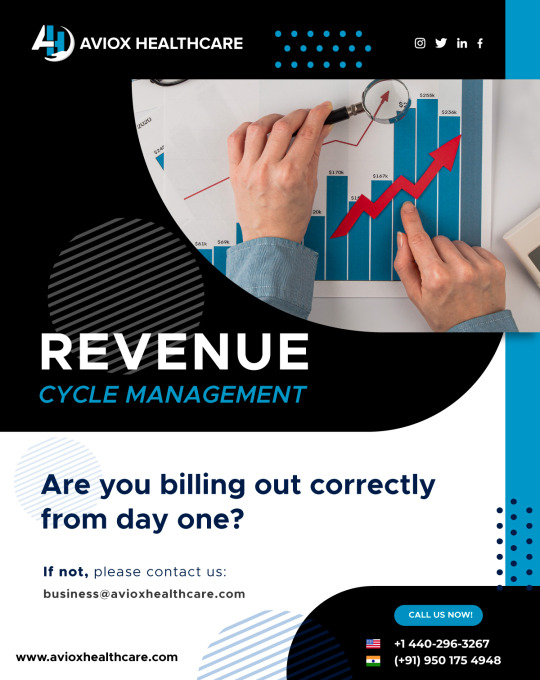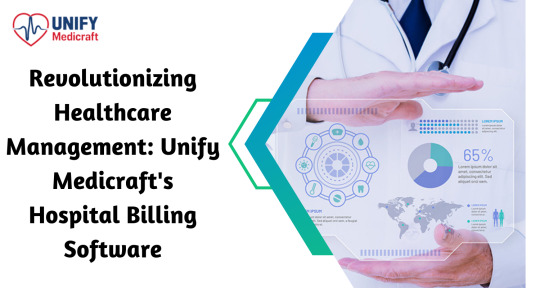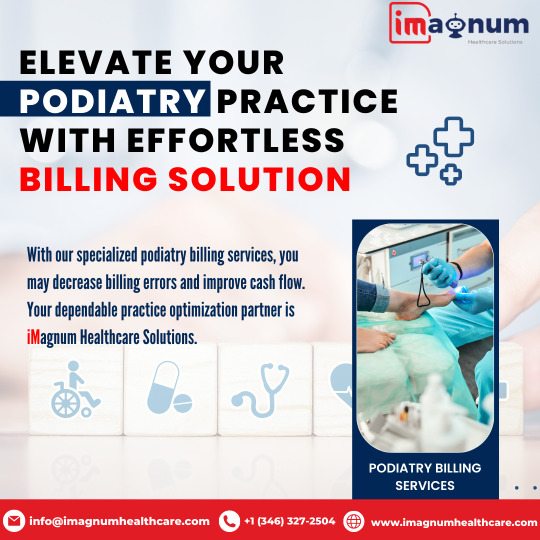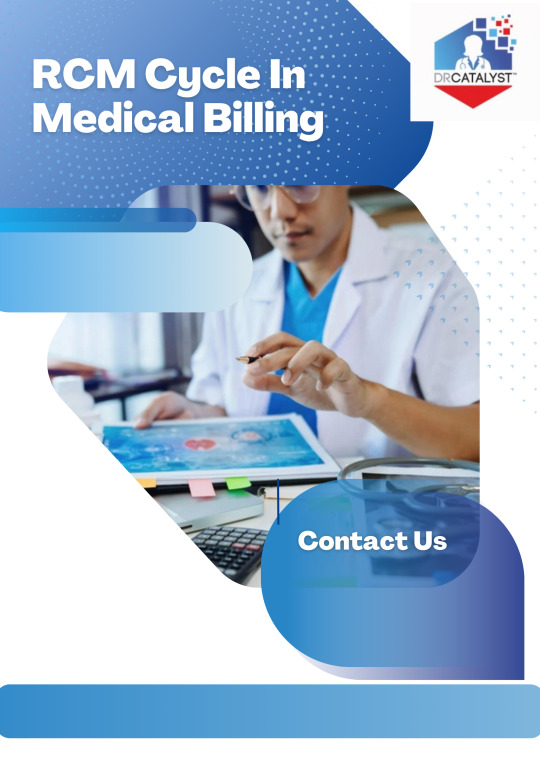#medical billing in rcm
Text
youtube
#Medical billing services#medical billing and coding services#revenue cycle management services#medical billing in rcm#healthcare coding services#affordable medical billing services#medical billing in US#Youtube
0 notes
Text

Expert Medical Billing Services Company in New York
RCM Billing Services is a full medical billing company providing services to healthcare providers in New York & Texas. Maximize your revenue and streamline your practice with our comprehensive medical billing services in New Jersey. Our team of experts ensures accurate and timely processing, reducing claim denials and improving cash flow.
#medical billing in new york#medical billing services in new york#medical billing company in new york#medical billing services in new jersey#medical billing in new jersey#medical billing company in new jersey#medical billing company in texas#medical billing services in texas#RCM Billing
2 notes
·
View notes
Text
Medical practices plan hundreds of appointments, including new patient appointments and follow-ups for existing patients. The healthcare business is constantly striving to improve patient scheduling. Scheduling is essential for a successful practice, but it may also take a significant amount of your staff’s time if not done correctly. One of the most significant aspects of practice management is effective patient scheduling, which results in happier patients, improved revenue, and a simplified medical office schedule. By implementing online scheduling software, you can minimize the time required to arrange appointments and improve your practice’s operational efficiency.
#patients#efficiency#schedule#patient scheduling#medical billing#medical billing cycle#healthcare#medical#health#appointment#employees#business#management#RCM
9 notes
·
View notes
Text

When you ask for #RevenueCycleManagement, Aviox Healthcare is the only best option to choose. You can select from our different services to ensure your RCM process will take a smooth flow. Visit us to know more www.avioxhealthcare.com or call us at +1 440 296 3267.
#Healthcare Analytics#Revenue Cycle Management#Revenue Cycle Management Healthcare#Healthcare Revenue Cycle#Rcm In Medical Billing#Revenue Cycle Management Companies
3 notes
·
View notes
Text
Benefits of Outsourcing Dental Billing Services
Introduction
Medical coding stands as a critical linchpin in the vast machinery of healthcare management, ensuring not just the efficacy but also the economic vitality of medical practices worldwide. This intricate process involves translating myriad medical diagnoses, treatments, procedures, and equipment into universal codes that are essential for billing and claims. The implications of medical coding stretch far beyond mere administrative necessity; they touch upon the financial sustainability of healthcare providers and affect the accuracy of healthcare statistics and planning. Understanding the symbiotic relationship between medical coding and the revenue cycle is essential for anyone involved in healthcare management, as it influences financial outcomes and operational efficiency.
Understanding Medical Coding
Medical coding is a sophisticated framework used to convert descriptions of diseases, injuries, and healthcare procedures into alphanumeric codes. This system serves as the backbone for healthcare billing, allowing for efficient processing and analysis of patient care data. These codes, derived from documentation such as physician’s notes, laboratory results, and radiologic evaluations, must be meticulously applied to ensure that healthcare providers receive appropriate reimbursement. The complexity of medical coding is compounded by the need for coders to stay abreast of frequent updates and changes in coding standards like ICD (International Classification of Diseases) and CPT (Current Procedural Terminology).
The Revenue Cycle Explained
The revenue cycle is a comprehensive term that describes the financial process that healthcare facilities use to track patient care episodes from registration and appointment scheduling to the final payment of a balance. This cycle encompasses several critical steps including patient registration, insurance verification, charge capture, claim submission, coding, payment posting, and statement processing. Each phase is crucial and must be handled with acute precision to ensure that the cycle functions seamlessly. Errors in any part of this cycle can lead to delays in payments and denials of claims, which in turn can severely impact the financial health of a healthcare provider.
Impact of Accurate Medical Coding on Revenue Cycle
Accurate medical coding is paramount for the swift and effective functioning of the revenue cycle. It ensures that healthcare providers are reimbursed for the services they deliver, which is essential for maintaining financial stability and ensuring continuous patient care. Accurate coding reduces the incidence of claim denials from insurers due to errors or discrepancies, thereby expediting the payment process. Furthermore, precise coding helps in forecasting trends and preparing budgets by providing a clear picture of income versus services rendered. It also assists in regulatory compliance and auditing processes, which are critical for maintaining the integrity of healthcare practices.
Common Challenges in Medical Coding
Medical coding faces numerous challenges that can stymie the revenue cycle. Primary among these is the high error rate due to complex medical terminology and evolving standards. Additionally, insufficient training and a shortage of qualified coders often lead to inaccuracies that delay the billing process and inflate healthcare costs. The dynamic nature of healthcare regulation requires coders to continually update their skills, a necessity that can be both time-consuming and costly. Moreover, the integration of new technologies like Electronic Health Records (EHR) introduces another layer of complexity to the coding process, requiring constant adaptation by coding professionals.
Strategies for Effective Medical Coding
To mitigate the complexities of medical coding, several strategies can be implemented. First, ongoing education and training programs for coders are essential to keep them updated with the latest coding standards and technologies. Leveraging advanced coding software equipped with artificial intelligence can help enhance accuracy and reduce the burden on human coders. Furthermore, implementing rigorous auditing processes to regularly review coded data can help catch errors early and improve coding accuracy over time. These strategies collectively ensure that coding remains precise and aligned with the latest industry practices, thus supporting a robust revenue cycle.
Integration of Coding with Revenue Cycle Management
Seamless integration of medical coding with revenue cycle management is crucial for the financial health of healthcare institutions. This integration involves synchronizing the coding process with patient registration, charge capture, and billing operations to enhance workflow efficiency. By ensuring that every medical service is correctly coded and billed at the point of care, healthcare providers can minimize claim denials and speed up reimbursement. Advanced software systems that allow for real-time data exchange and error checking play a pivotal role in this integration, ensuring that all components of the revenue cycle are aligned and functioning effectively.
Improving Revenue Cycle Performance through Coding
Enhancing the performance of the revenue cycle through proficient medical coding involves several tactical approaches. One effective method is the standardization of coding practices within the institution to minimize variability and errors. Investing in state-of-the-art coding technologies can also expedite the coding process and increase its accuracy. Furthermore, fostering a collaborative environment where coders work closely with healthcare providers to ensure documentation accuracy can significantly boost the efficacy of medical coding. These efforts collectively enhance the reliability of the revenue cycle, leading to improved financial outcomes and patient satisfaction.
Future Trends in Medical Coding and Revenue Cycle
The future of medical coding and the revenue cycle is poised for significant transformation, driven by technological advancements and regulatory changes. The increasing adoption of AI and machine learning is expected to revolutionize medical coding by increasing accuracy and reducing turnaround times. Furthermore, the shift towards value-based care is prompting
a reevaluation of traditional revenue cycle processes to ensure they align more closely with patient outcomes. Anticipating these trends and preparing for their impact is essential for healthcare providers to stay competitive and compliant in a rapidly evolving industry.
Conclusion
Medical coding is more than just a clerical task; it is a critical component of the healthcare revenue cycle that directly impacts the financial and operational efficacy of healthcare institutions. The precision of medical coding processes significantly influences the speed and accuracy of billing and reimbursement, dictating the financial stability of healthcare providers. As the healthcare industry continues to evolve, so too must the strategies for effective medical coding and revenue cycle management. Embracing technological advancements and adapting to new regulatory demands are crucial for healthcare providers aiming to optimize their financial operations and continue delivering high-quality care.
0 notes
Text
QWay HealthCare – Your Premium Revenue Cycle Partner
Why shoulder the burden of coding alone? Our team of multi-coding experts offers tailored solutions to enhance your hospital's revenue potential. We'll handle the complexities, you take care of your patients.
Reach out via email today to discover how our expertise can optimize your medical coding practices.
#rcm#medical billing and coding#medical coding#healthcare#medical billing outsourcing#medical billing services#medicalbilling#QWay HealthCare#QWay
0 notes
Text
Your Ultimate DME Billing Solution | Eminence RCM

Navigating the complex landscape of Durable Medical Equipment (DME) billing can be daunting due to constantly changing payor policies, reimbursement regulations, and compliance requirements. Staying updated with these industry changes is crucial but can be frustrating without expert knowledge. To achieve the best outcomes, partnering with a trusted industry expert is essential for precise DME billing service.
Eminence RCM stands out as a leading provider of DME billing services. By choosing Eminence RCM, you gain a partner that expertly handles document review, claims submission, accounts receivable, and cash posting. Our goal is to reduce denials and streamline your revenue cycle through our professional DME billing solutions.
0 notes
Text
Revolutionizing Healthcare Management: Unify Medicraft's Hospital Billing Software
In the ever-evolving landscape of healthcare, efficiency, accuracy, and transparency are paramount. Hospital billing, a crucial aspect of healthcare administration, often encounters challenges ranging from complex coding requirements to managing insurance claims. Recognizing these challenges, Unify Medicraft has emerged as a pioneer in revolutionizing healthcare management through its cutting-edge hospital billing software.
Unify Medicraft hospital billing software stands out for its comprehensive features designed to streamline the billing process, enhance revenue cycle management, and improve overall operational efficiency within healthcare institutions.

1. Seamless Integration:
One of the standout features of Unify Medicraft's hospital billing software is its seamless integration capabilities. The software seamlessly integrates with existing hospital management systems, electronic health records (EHR), and other essential healthcare software, ensuring a smooth transition and minimal disruption to daily operations. This integration eliminates the need for manual data entry, reducing errors and improving accuracy in billing processes.
2. Automated Billing Processes:
Manual billing processes are not only time-consuming but also prone to errors. Unify Medicraft's software automates various billing tasks, including charge capture, claim generation, and submission. By leveraging advanced algorithms and machine learning capabilities, the software accurately codes services, diagnoses, and procedures, ensuring compliance with regulatory requirements and maximizing reimbursement rates.
3. Real-Time Eligibility Verification:
Insurance eligibility verification is a critical step in the billing process, yet it can be labor-intensive and prone to delays. Unify Medicraft's hospital billing software offers real-time eligibility verification, allowing healthcare providers to instantly verify patients' insurance coverage and eligibility for services. This feature minimizes claim denials due to eligibility issues and accelerates the revenue cycle by facilitating prompt billing.
4. Claims Management and Denial Prevention:
Managing insurance claims and preventing denials are major challenges faced by healthcare institutions. Unify Medicraft's software simplifies claims management by providing intuitive tools for tracking claim status, identifying bottlenecks, and resolving issues promptly. Additionally, the software utilizes built-in analytics to identify patterns and trends that may lead to claim denials, allowing healthcare providers to take proactive measures to prevent them.
5. Customizable Reporting and Analytics:
Data-driven insights are invaluable for optimizing revenue cycle management and identifying areas for improvement. Unify Medicraft's hospital billing software offers customizable reporting and analytics capabilities, allowing healthcare administrators to generate comprehensive reports tailored to their specific needs. These reports provide actionable insights into key performance indicators, revenue trends, and operational efficiencies, empowering healthcare providers to make informed decisions and drive continuous improvement.
6. Compliance and Security:
Compliance with healthcare regulations such as HIPAA (Health Insurance Portability and Accountability Act) is non-negotiable when it comes to managing patient data and billing information. Unify Medicraft's software prioritizes compliance and data security, employing robust encryption protocols and access controls to safeguard sensitive information. Additionally, the software undergoes regular updates to ensure adherence to evolving regulatory standards, providing healthcare institutions with peace of mind and mitigating the risk of non-compliance.
7. Scalability and Flexibility:
As healthcare institutions grow and evolve, their billing needs may change accordingly. Unify Medicraft's hospital billing software is designed with scalability and flexibility in mind, accommodating the evolving needs of healthcare providers. Whether it's adding new functionalities, integrating with third-party systems, or scaling up to support increased patient volumes, the software adapts seamlessly to meet the changing demands of healthcare organizations.
8. Enhanced Patient Experience:
A seamless billing process not only benefits healthcare providers but also enhances the overall patient experience. Unify Medicraft's software prioritizes patient-centricity by offering transparent billing practices, easy-to-understand statements, and convenient payment options. By simplifying the billing experience for patients, healthcare providers can improve patient satisfaction and loyalty, ultimately leading to better outcomes and increased patient retention.
Conclusion:
In an era where healthcare delivery is increasingly complex and demanding, Unify Medicraft's hospital billing software emerges as a beacon of innovation and efficiency. By streamlining billing processes, enhancing revenue cycle management, and prioritizing compliance and patient-centricity, the software empowers healthcare providers to focus on what matters most – delivering high-quality care to their patients. As healthcare continues to evolve, Unify Medicraft remains at the forefront, driving positive change and revolutionizing healthcare management for the better.
#medicaid billing software#medical billing software#billing software#best rcm software#dental billing software#dme billing software#hme billing services
0 notes
Text
Streamlining Your Medical Practice: A Comprehensive Guide to Outsourcing Medical Billing
Introduction to Outsourcing Medical Billing

In the complex landscape of healthcare, medical billing plays a pivotal role. It's not just about billing patients for services rendered; it's about ensuring the financial health of your practice. However, managing medical billing in-house can be overwhelming and time-consuming. This is where outsourcing comes into play.
Outsourcing medical billing involves hiring a third-party service provider to handle the billing and revenue cycle management processes. This allows healthcare providers to focus on patient care while experts manage the intricacies of billing and collections.
Understanding the Basics of Medical Billing
Medical billing and coding is the process of submitting and following up on claims with health insurance companies to receive payment for services rendered by a healthcare provider. It involves various steps, including patient registration, coding, claim submission, payment posting, and denial management.
Challenges in In-House Medical Billing
Managing medical billing in-house comes with its own set of challenges. From the administrative burden of handling paperwork to the risk of non-compliance with ever-changing regulations, numerous hurdles practices face.
Advantages of Outsourcing Medical Billing
Outsourcing medical billing offers several advantages. Firstly, it can significantly reduce costs associated with maintaining an in-house billing department. Secondly, outsourcing provides access to specialized expertise in medical coding and billing, ensuring accurate and timely reimbursement. Lastly, it can improve the efficiency of the revenue cycle management process, leading to faster payments and increased cash flow.
How to Choose the Right Medical Billing Service
When selecting a medical billing service, it's essential to consider factors such as expertise, experience, compliance, and technology. Look for a provider with a proven track record in the healthcare industry, knowledgeable staff who stay abreast of regulatory changes, and robust security measures to protect patient data.
Steps to Streamline Your Practice with Outsourced Billing
To maximize the benefits of outsourcing medical billing, it's crucial to streamline your practice's processes. Start by evaluating your current billing workflow, setting clear goals and expectations for the billing service, maintaining open lines of communication, and regularly monitoring performance metrics.
Common Mistakes to Avoid
Some common pitfalls to avoid when outsourcing medical billing include not fully understanding the terms of the contract, failing to communicate effectively with the billing service, and ignoring feedback and performance data.
Case Studies: Success Stories with Outsourced Medical Billing
Real-life examples of practices that have successfully outsourced their medical billing can provide valuable insights into the benefits of this approach. From improved cash flow to reduced claim denials, these case studies highlight the positive impact that outsourcing can have on a practice's financial health.
The Future of Medical Billing
As technology continues to evolve, so too will the field of medical billing. From the adoption of electronic health records to the use of artificial intelligence and machine learning algorithms, the future promises exciting advancements that will further streamline the billing process and improve efficiency.
Why Choose Velan HCS
When it comes to medical billing, it's important to choose a reliable partner that can help you navigate the complex world of healthcare reimbursement. Velan Health Care Services is a trusted name in medical billing and coding, with years of experience working with healthcare providers in the USA.
Velan HCS offers a range of services, including medical coding, claims processing, denial management, and revenue cycle management, among others. Their team of experts is well-versed in the latest industry standards and regulations, ensuring that your claims are processed accurately and efficiently.
What sets Velan HCS apart is its commitment to customer service. They understand that every practice is unique, and they work closely with their clients to develop customized solutions that meet their specific needs. With Velan HCS, you can rest assured that you have a partner who is dedicated to helping you maximize your revenue and streamline your operations.
In short, if you're looking for a reliable and experienced partner for your medical billing needs, Velan HCS is an excellent choice.
Conclusion
Outsourcing medical billing can be a game-changer for healthcare practices looking to streamline their operations and improve their bottom line. By partnering with a reputable billing service, practices can reduce costs, increase efficiency, and focus on what matters most: providing quality care to their patients.
FAQs
What are the typical costs associated with outsourcing medical billing?
The cost of outsourcing medical billing can vary depending on factors such as the size of the practice, the volume of claims processed, and the level of service provided. Typically, billing services charge a percentage of the practice's monthly collections or a flat fee per claim.
How can I ensure the security of patient data when outsourcing billing?
When outsourcing medical billing, it's essential to choose a provider that prioritizes data security and compliance with HIPAA regulations. Look for measures such as encryption, secure data transmission protocols, and regular security audits.
Will outsourcing affect the relationship between my practice and patients?
When done correctly, outsourcing medical billing should have no negative impact on the relationship between your practice and your patients. Patients will continue to interact with your staff for their healthcare needs, while the billing process is handled externally.
Can outsourcing billing help reduce claim denials?
Yes, outsourcing medical billing to experienced professionals can help reduce claim denials by ensuring accurate coding, thorough documentation, and timely follow-up on rejected claims.
Is outsourcing medical billing suitable for all types of healthcare practices?
While outsourcing medical billing can benefit practices of all sizes and specialties, it's essential to evaluate your specific needs and goals to determine if outsourcing is the right choice for your practice.
#medical billing#outsource medical billing#RCM for Medical Billing#Healthcare in Medical billing#medical billing services
0 notes
Text
#Urology Billing Services#urology medical billing services#affordable urology billing services#urology billing services in US#urology billing services in New York#best urology medical billing services#Urology Billing Services in rcm
0 notes
Text
#gastroenterology billing services#medical billing services cherry hill nj#hedis measures reporting services in rcm#hedis measures reporting services in medical billing#credit balance medical billing service in rcm#holiday staffing support services#migrate to new emr pms services#contract negotiation in rcm#patient demographic entry in rcm#patient demographic entry medical billing services#ar run down and recovery audit services#under paid claim audit#credit balance medical billing service#document mangement services - medical billing#diagnosis-related group rcm#proprietary ehr serives#coding denial management services in rcm#patient demographic entry billing services#under paid claims audit
0 notes
Text
The Revenue Cycle Management Technology Race And How To Win It
Introduction
In today's fast-paced healthcare landscape, the effective management of revenue cycles is paramount for the financial health of healthcare providers. As technology continues to evolve, so too does the realm of Revenue Cycle Management (RCM). Understanding the evolution, key components, challenges, emerging trends, and strategies for success in RCM technology is essential for staying ahead in the competitive healthcare industry.
The Evolution of RCM Technology
The journey of Revenue Cycle Management (RCM) technology has been one of continual transformation. From the days of manual paper-based processes to the current era of advanced digital solutions, RCM technology has undergone a remarkable evolution. This evolution has been driven by the need for greater efficiency, accuracy, and compliance in managing the complex financial processes within healthcare organizations.
Key Components of RCM Technology
At the core of RCM technology lie several key components that work together to streamline revenue cycles and maximize financial outcomes for healthcare providers. These components include billing and claims management, patient registration and eligibility verification, coding and documentation, and payment processing and reconciliation. Each component plays a crucial role in ensuring the smooth flow of revenue through the healthcare system.
Challenges in RCM Technology Adoption
While the benefits of RCM technology are undeniable, its adoption poses significant challenges for healthcare organizations. Integration complexities, regulatory compliance issues, and data security concerns are among the primary obstacles faced in implementing RCM technology. Overcoming these challenges requires careful planning, collaboration, and investment in resources and infrastructure.
Emerging Trends in RCM Technology
The landscape of RCM technology is continuously evolving, with new trends and innovations shaping the future of revenue cycle management. Artificial intelligence and machine learning applications, predictive analytics, and telehealth integration are among the emerging trends revolutionizing RCM technology. These advancements hold the promise of greater efficiency, accuracy, and scalability in managing revenue cycles.
Choosing the Right RCM Technology Partner
Selecting the right technology partner is crucial for the successful implementation and optimization of RCM technology. Healthcare organizations must carefully evaluate vendors based on their offerings, features, flexibility, and scalability. Additionally, consideration should be given to implementation and support services to ensure a smooth transition and ongoing support for RCM technology solutions.
Strategies for Winning the RCM Technology Race
To stay ahead in the RCM technology race, healthcare organizations must employ strategic approaches aimed at maximizing the benefits of RCM technology. Streamlining workflows, empowering staff with training and resources, and leveraging data insights for strategic decision-making are among the key strategies for success. By adopting these strategies, healthcare providers can optimize revenue cycles and achieve sustainable financial outcomes.
Case Studies: Success Stories in RCM Technology Implementation
Real-world case studies provide valuable insights into the benefits and challenges of RCM technology implementation. By examining success stories from healthcare providers who have successfully implemented RCM technology, organizations can gain valuable lessons and best practices for their own journey. These case studies highlight the transformative impact of RCM technology on revenue cycles and financial performance.
Conclusion
In conclusion, the evolution of RCM technology presents both challenges and opportunities for healthcare organizations. By understanding the key components, challenges, emerging trends, and strategies for success in RCM technology, healthcare providers can position themselves for success in the competitive healthcare landscape. With the right technology partner and strategic approach, organizations can harness the power of RCM technology to optimize revenue cycles and achieve long-term financial sustainability.
0 notes
Text

Embarking on the journey through podiatry medical billing complexities, we navigate with precision and expertise, understanding that every claim processed is a pivotal step towards achieving financial health and maintaining operational harmony.
0 notes
Text

The RCM cycle in medical billing in healthcare is the business process that enables organizations to be paid for services. It optimizes total patient service revenue in a healthcare practice by streamlining billing. The process consists of identifying, managing, and collecting patient service revenue. DrCatalyst has a team of medical billing professionals who provide the best in the business RCM billing services. If you need more information then kindly visit our website.
0 notes
Text
Optimizing Success with Dental Revenue Cycle Management Services
Introduction
In the intricate realm of dental practice management, Revenue Cycle Management (RCM) emerges as a critical component ensuring the financial health of dental clinics. Effectively navigating the complexities of RCM demands a comprehensive understanding of its key components and strategies. From billing accuracy to compliance considerations, each facet plays a pivotal role in optimizing revenue streams and sustaining operational excellence.
The Key Components of Dental RCM
Billing and Coding Accuracy
At the heart of Dental RCM lies the precision of billing and coding practices. Accurate coding not only facilitates seamless reimbursement but also mitigates the risk of claim denials and audits. Dental professionals must adeptly translate diagnoses and procedures into universally recognized codes, adhering to established guidelines such as the Current Dental Terminology (CDT) and International Classification of Diseases (ICD) coding systems.
Insurance Verification and Claims Processing
Efficient insurance verification processes lay the groundwork for smooth claims processing. Verifying patient coverage details, eligibility, and benefit limitations in advance helps prevent payment delays and denials. Streamlining claims submission and processing workflows ensures timely reimbursement while minimizing administrative burdens on dental staff.
Payment Collection and Accounts Receivable Management
Timely and systematic payment collection mechanisms are indispensable for maintaining healthy cash flow and minimizing outstanding accounts receivable. Implementing clear financial policies, offering flexible payment options, and promptly addressing patient inquiries contribute to a robust revenue collection process. Effective accounts receivable management involves diligent tracking, follow-up on outstanding balances, and strategic resolution of overdue accounts to optimize revenue realization.
Utilizing Technology in Dental RCM
The integration of advanced technologies revolutionizes dental RCM practices, enhancing efficiency, accuracy, and patient satisfaction. From automated billing systems to intuitive practice management software, technology streamlines administrative tasks, reduces errors, and facilitates seamless communication with payers and patients. Leveraging data analytics and predictive modeling empowers dental practices to identify revenue trends, anticipate payment bottlenecks, and proactively optimize RCM strategies for sustained financial success.
Compliance and Regulatory Considerations
Navigating the intricate landscape of healthcare regulations and compliance standards is paramount in dental RCM. Ensuring adherence to HIPAA regulations, coding guidelines, and payer policies safeguards patient confidentiality and prevents potential legal repercussions. Regular audits, ongoing staff training, and robust compliance protocols are essential for mitigating compliance risks and upholding ethical standards in revenue management practices.
Training and Staff Development
Investing in comprehensive training and professional development programs is instrumental in fostering a skilled and knowledgeable workforce proficient in dental RCM practices. Equipping staff with specialized training in billing procedures, coding updates, and regulatory compliance cultivates a culture of excellence and accountability. Continuous learning initiatives empower dental teams to adapt to evolving industry trends, enhance job performance, and deliver superior patient-centric care.
Outsourcing vs. In-house RCM
The decision to outsource RCM functions or manage them in-house warrants careful consideration of various factors, including cost-effectiveness, expertise, and resource allocation. While outsourcing RCM services to specialized vendors may offer scalability and access to advanced technologies, maintaining in-house control provides greater autonomy and customization options. Evaluating the pros and cons of each approach based on practice size, complexity, and strategic objectives is essential in determining the most viable RCM solution.
Measuring RCM Performance and Success
Effectively measuring RCM performance metrics is indispensable for evaluating financial health, identifying areas for improvement, and benchmarking success. Key performance indicators (KPIs) such as clean claim rate, days in accounts receivable, and collection ratio offer valuable insights into revenue cycle efficiency and effectiveness. Utilizing data-driven analytics and comparative benchmarks enables dental practices to optimize workflows, enhance revenue streams, and drive sustainable growth.
Conclusion
In conclusion, mastering the intricacies of dental Revenue Cycle Management is pivotal for ensuring the financial viability and long-term success of dental practices. By prioritizing billing accuracy, embracing technology-driven solutions, and fostering a culture of compliance and continuous improvement, dental professionals can navigate the complexities of RCM with confidence and achieve optimal revenue outcomes. Through strategic alignment of key components and ongoing performance evaluation, dental practices can position themselves for sustained growth, profitability, and excellence in patient care.
0 notes
Text
Contact QWay Healthcare
Are you looking to enhance your Revenue Cycle Processes - From Front Desk to Reimbursement by partnering with QWay Healthcare?
Reach out to us today to discover more about our customized solutions and how we can assist your organization's Revenue Cycle Management requirements.
#rcm#medical billing and coding#medical coding#healthcare#medical billing services#medical billing outsourcing#medicalbilling#QWay#QWay Healthcare#RCO#revenue cycle management#Revenue Cycle Process
0 notes